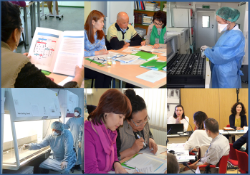Laboratory diagnosis

Timely and accurate laboratory diagnostic services are crucial for detecting TB and multidrug-resistant TB (MDR–TB), and for providing patients with appropriate treatment. New molecular techniques, which reduce the time needed for TB and MDR-TB detection significantly, are particularly important for treatment initiation, as well as reduction and control of further disease transmission.
In the WHO European Region, where MDR-TB rates are the highest globally, improving early diagnosis is critical to address the challenges of MDR-TB and at-risk groups, including prisoners and people living with HIV. This requires a paradigm shift in laboratory policy development – setting laboratory norms and standards, guiding and coordinating technical assistance and accelerating knowledge transfer.
The European Laboratory Initiative on TB, HIV and Viral Hepatitis (ELI)
WHO/Europe established the European Laboratory Initiative (ELI) to facilitate this paradigm shift and strengthen laboratory capacity to diagnose MDR-TB across the WHO European Region, with a focus on countries in which TB is a high priority.
In 2018, ELI’s mission was expanded to also cover testing, diagnosis, monitoring and laboratory needs for TB/HIV coinfection, HIV and viral hepatitis, with the ultimate objective of strengthening and making more efficient the response to all 3 diseases in the Region.
WHO/Europe hosts the ELI Secretariat; it also provides technical assistance to Member States on TB laboratory- and diagnosis-related areas through country assessments and capacity-building.







